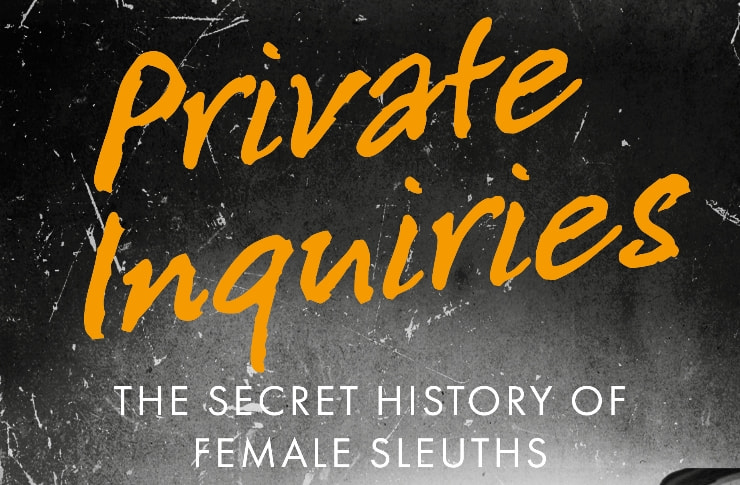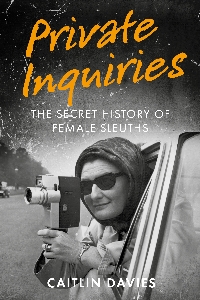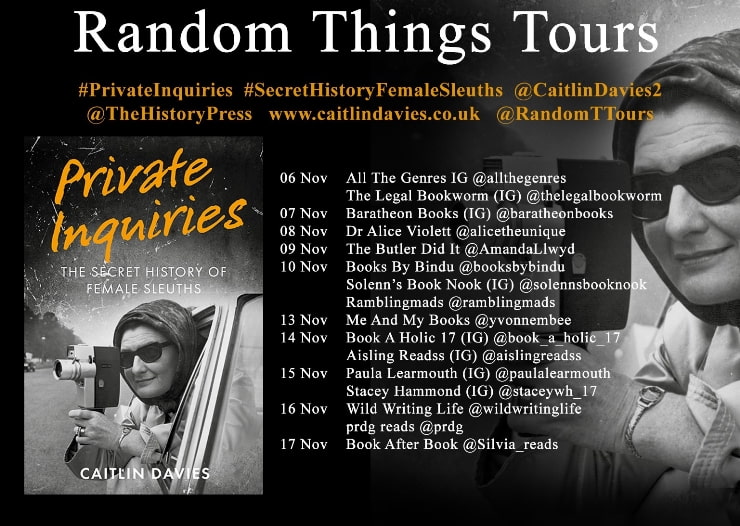Blog tour: Private Inquiries: The Secret History of Female Sleuths by Caitlin Davies

This post is part of a blog tour organised by Random Things Blog Tours. I received a free copy of the book in return for an honest review.
‘The female private detective has been a staple of popular culture for over 150 years, from Victorian lady sleuths to ‘busy-body spinsters’ and gun-toting modern PIs.
‘But what about the real-life women behind these fictional tales – what crimes did they solve, and where are their stories?
‘In Private Inquiries, Caitlin Davies traces the history of the UK’s female investigators, uncovering the truth about their lives and careers from the 1850s to the present day.
‘Caitlin also follows in the footsteps of her subjects, undertaking a professional qualification to become a Private Investigator, and meeting modern PIs to disentangle fact from fiction.
‘Female investigators are on the rise in the UK – and despite the industry’s sleazy reputation, nearly a third of new trainees are women. After a century of undercover work, it’s time to reveal the secrets of their trailblazing forebears.

In Private Inquiries, we follow Caitlin Davies as she researches female private investigators from the 1850s to today: who they were/are, what drew them to the profession, and what their work involved/involves.
She also completes a qualification in Private Investigation, talks to current PIs, and does a spot of work experience to find out how the industry operates in the present day.
As an erstwhile historian, Private Inquiries was right up my street! As well as learning lots about women PIs in days gone by, I enjoyed how Davies inserted herself into the narrative.
Davies doesn’t simply recount the stories of the various PIs of note she identifies, but tries her hand at being a PI herself, and informs us of the stumbling blocks and discrepancies she encounters in the course of her research.
While she doesn’t turn out to be the best at shadowing people, as a journalist and historian, Davies is nonetheless well-suited to private investigation. Many of the historical investigators told tall stories about themselves and their cases, and I was intrigued as she dug up hints as to the true origins of these women and their reported escapades.
These women may have embellished and exaggerated their stories, but that doesn’t make them worthless as historical sources by any means! After all, a central conceit of my thesis is that the real value in people’s life stories isn’t “the truth” as such, but what they choose to tell us, how they present it, and what that says about the world around them.
Accordingly, the PIs’ accounts of themselves and their work enable Davies to situate them in the wider context of the time, and explain its influence on them.
One example of this is that some of them obfuscated their official names, histories, and marital statuses in order to appear more “respectable” and qualified, and therefore worthy of being hired to carry out sensitive investigatory work.
Some women turned to private investigation to support themselves after their marriages broke down, but as separation and divorce were so taboo, it made sense to style themselves as ‘Mrs’, so as not to deter potential clients.
Another example is that some women PIs – with the help of journalists or ghost writers – portrayed previous cases as involving glamorous and/or international settings, wealthy and high-profile clients, danger, and unlikely or obscure clues.
This aligned with the exciting public image of private investigators (think Sherlock Holmes) and helped promote these women’s businesses, but in reality, much of their work was mundane.
Even so, it’s clear that they enjoyed taking on different personas, getting to use their initiative and powers of deduction, and being employers rather than employees.
Throughout the book, investigators tell us that women are particularly suited to the job because they are “naturally” more intuitive, instinctual, and observant than men. As Davies points out, though, ideas about “male” and “female” brains are harmful myths, and our environment has a huge part to play in our development.
I concur: if women are more likely to show these characteristics, it’s because many of us are trained in these characteristics from such a young age that they seem inborn.
Middle-class girls in the earlier part of the period especially were raised to anticipate and fulfil the needs of others, therefore cultivating the quality of attentiveness. What’s more, girls in particular are taught to be aware of their surroundings, to the point of hypervigilance, in order to keep themselves safe from predatory men.
Even though some male PIs and police officers hired women due to these “natural” advantages – as well as their ability to infiltrate domestic spaces without arousing suspicion – by and large, women PIs weren’t taken seriously, let alone venerated like some of their male counterparts, and their work was regarded as incompatible with home, family life, and “seemliness”.
While women investigators have always been keen to extol the virtues of their gender as a whole, some of their earlier conduct could be regarded as unsisterly to say the least.
Davies describes cases where women were employed to spy on other women whose morals were in question, and even attempted to entrap them in order to secure evidence that could be used against them in divorce proceedings.
She also talks about some of the first women who worked for the police, searching, transporting, chaperoning, and guarding female suspects and prisoners. While this was preferable to the alternative, it did put me in mind of the women who were employed to search their peers for witch marks a couple of centuries earlier!
Private Inquiries is an interesting and thought-provoking dive into the history of female private investigators.
